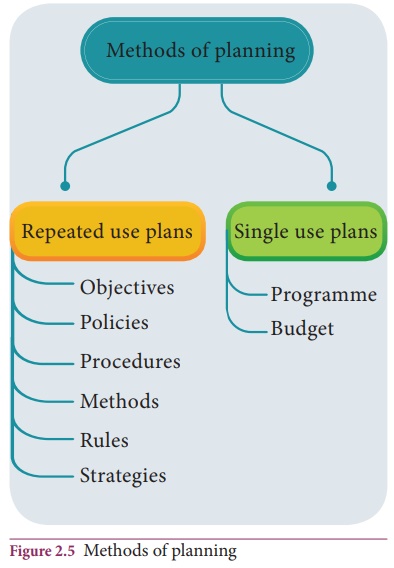Chapter: 12th Office Management and Secretaryship : Chapter 2 : Planning
Methods of Planning
Methods of Planning
Planning
consists of several individual plans depending upon nature and scope. it can be
classified as follows:

Repeated use plans
These plans
can be used again and again. The elements of standing plans are
1. Objectives
Objectives are
the end towards which the activities of an organisation are directed. For
planning, objectives are essential. Planning has no meaning if it is not
related to objectives. Objectives are useful for all managerial purposes. It is
expressed in measurable statement in written form. For example, hire and fully
train five new customer service staff members by June 30.
2. Policy
Policies
provide the framework within which the decision makers are expected to operate
while making the decisions relating to the organisation. They are the guide for
thinking and the action of subordinate for attaining the goal. It shows the
limit within which the organisational decisions have to be made. For example,
an enterprise may follow a policy of selling its products only on cash basis.
3. Procedure
A procedure
will lay down the manner in which certain work has to be performed. It
prescribes the sequence of operations to be carried out to complete a given task.
For example, procedure is laid down in an organisation for purchase of raw
material, selection of employees, etc.
4. Methods
Methods
specifies the way in which a particular step is to be performed, procedure
tells the various steps to be taken to perform a particular task, but method
tells how a particular step in the procedure is to be performed. The definition
of a method is a system or a way of doing something. An example of a method is
a teacher’s way of cracking an egg in a cooking class.
5. Rules
A rule
specifies the people to do or not to do certain things. They are always rigidly
enforced. For example, no smoking in working place, wear uniform in factory
etc,. There is always a fine or penalty for the violation of rules.
6. Strategies
Strategy is a
term which is normally used in battlefield for planning a military movement,
handling of troops, etc. In business, strategy means tactics adopted to counter
competitor’s actions. It is also concerned with meeting the challenges posed by
the policies and the actions of the competitors in the market. For example,
keeping prices low to attract more customers. Since profit margins are very
low, the business must sell a lot of products to make money.
Single use plan
Single use
plan are used for a specific purpose only. As soon as the purpose is over the
plan becomes useless. Programmes and budgets are the examples of single use
plan.
1. Programme:
Programme
specific the date and time by which the activities of the enterprise will be
carried out. Programme may be major or minor in nature. For example, to sell
10,000 cycles by the end of the year is the sales programme of the company.
2. Budget:
A budget is
the financial plan of a business. It is expressed in numerical terms. A budget
is a plan you write down to decide how you will spend your money each month. A
budget shows you: how much money you make? And how you spend your money?
Before
preparing the budget, the past happenings, the present needs and future trends
are taken into account. Budget is always prepared for specific period of time
i.e., for a month, for half year or whole year. A budget helps you decide: what
you must spend your money on? And if you can spend less money on some things
and more money on other things. For example, your budget might show that you
spend Rs.1000 on clothes every month. You might decide you can spend Rs.500 on
clothes. You can use the rest of the money to pay bills or to save for
something else.
Related Topics